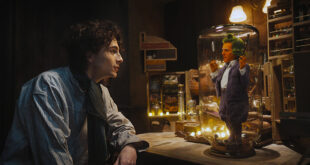Taylor Swift may have singlehandedly salvaged the fall box office with “The Eras Tour.” The cinematic rendering of her sold-out stadium tour danced into theaters not just as a blockbuster, but a cultural phenomenon.
With $95 million to $97 million in its domestic debut and $130 million globally, it’s easily the best start of all time for a concert film, as well as one of the biggest opening weekends of the year. At the higher end of projections, it could be the top-grossing October debut in North American history, a record currently held by 2019’s “Joker” with $96 million.
“This October, without Taylor Swift, would have been awful,” says Jeff Bock, an analyst with Exhibitor Relations. “This is a huge bright spot.”
And Swift, who self-produced the concert film, shook up every aspect of the movie theater business — from top-tier pricing to unconventional distribution and marketing to lax cell phone etiquette — in the process. Most notably, she cut out the middleman and partnered directly with AMC Theatres, the world’s largest cinema chain, rather than a major studio to unspool “The Eras Tour” on the big screen.
Beyoncé made a similar deal with AMC for “Renaissance: A Film By Beyoncé,” which opens in December. But of course, they’re among the few global superstars with the ability to command the zeitgeist and successfully arrange a deal like this. Others may attempt to replicate these results at their own peril.
With plenty to unpack from Swift-mania, here are four takeaways from the opening weekend of “The Eras Tour.”
People will pay more… for the right movie
The price of movie tickets has long been contended in Hollywood. Some parties believe that moviegoers would pay a little more for highly anticipated films, while others fear it could scare away customers. “The Eras Tour” proves there’s flexibility for certain big-screen extravaganzas.
Swift set the prices at $19.89, in reference to her birth year and 2014 album, for adults and $13.13, alluding to her lucky number, for children and seniors. (Imax and other premium formats came with additional charges). Swifties, as her fans are nicknamed, were not deterred even though tickets were more expensive than the nation’s average price. After all, it was significantly less than her sold-out stadium tour — and this seat came with a flawless view of the stage.
“Variable pricing works if the demand is there for products,” says Bock. “It’s there, and then some, for Taylor Swift.”
But he acknowledges that not every artist or director or movie star can pull off those prices. In the case of concert films, he adds, “It’s going to be hard to duplicate unless you are Taylor or Beyoncé.”
“These things will change”
Swift may have said it best. Traditional Hollywood studios (and exhibitors) may not want to hear this, but change is OK, even necessary, to keep a struggling business alive. Swift, as well as cinema owners, stand to make a lot of money from “The Eras Tour,” without adhering to the tried and true methods of theatrical distribution.
Bypassing studios allowed Swift to release the movie in a timelier fashion (it was added to the calendar just six weeks ago). As a result, theaters became concert venues rather than ghost towns in what otherwise would have been a depressing fall at the movies.
“We’re talking about a tentpole-level opening that didn’t exist on the planning calendar a few months ago,” says Shawn Robbins, the chief analyst at Box Office Pro.
David A. Gross, who runs the movie consulting firm Franchise Entertainment Research, believes it otherwise would have taken a lot longer for the film to grace the big screen. “Movies that do this kind of business generally take 18 to 24 months to plan, produce and release,” he says. And that’s “usually after years of creative development.”
This doesn’t have to be a cautionary tale for studios; there’s innovation that doesn’t require going around traditional distributors. But Swift was successful because she wasn’t afraid to do things differently. She didn’t want to stick to the one-size-fits-all blockbuster approach to putting movies in theaters. Beyond her decision to partner with AMC, Swift’s film benefitted from unconventional showtimes, prices and marketing efforts. Her efforts could broaden the scope of what’s considered a draw on the big screen.
FOMO at the multiplex
Fans were encouraged to treat the theatrical experience less like a movie screening and more like a concert — with singing, dancing and (gasp!) even using phones to record videos of the fun. To be clear, this is one of the few films in history that would benefit from such a spectacle. But it’s also evident that people are craving a communal experience when they leave the house to watch a movie.
The other biggest movie event of the year, “Barbenheimer,” the portmanteau for this summer’s popular double feature of “Barbie” and “Oppenheimer,” stoked a similar cultural craze. In that case, fans dressed up in pink (and black, for the Oppie heads in the house), and got a chance to be surrounded by people who were equally excited to be in the theater. The same was true earlier in 2023 with the campy sleeper hit “M3GAN.”
With “The Eras Tour,” one moviegoer went to several screenings during opening weekend because of the ambiance in the theater. “It was full of joy and happiness,” Jared Bass, a 25-year-old Manhattan resident, told Variety. “Is it nice to watch the movie? Yeah,” he says. “But the atmosphere is what brings me back.”
Often duplicated, rarely replicated
Hollywood loves a trend, but it doesn’t always identify the right follow-up. Hence the reason why there are 300 movies in development about Mattel toys rather than 300 projects in the works from the brain of “Barbie” director-writer Greta Gerwig. Plenty of music artists and Hollywood players will want to bring concert films to the big screen in the hopes of capturing a fraction of the frenzy around Swift. But the harsh reality is that very few will be able to get as many people to buy tickets. The good news is that these types of films don’t cost much to make, so they don’t require Swift-size returns to turn a profit. And that’s important because something this huge rarely comes around in this (or any) era.



